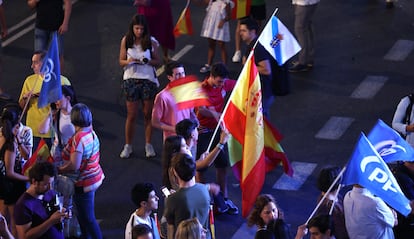Election in Spain: PP wins, PSOE resists and the right-wing bloc falls short of majority
The mainstream conservatives and far-right Vox together have 169 seats, while the Socialists and Sumar obtain a combined 153, both short of the 176-seat threshold

Spain’s most uncertain national election, held for the first time in the middle of the summer, is entering its final stage: the vote count is now nearly complete and the picture that emerges is that the center-right Popular Party (PP) has won the election, while the governing Socialist Party (PSOE) has resisted with a better showing than polls predicted. Despite the victory by the right-wing bloc, the latter falls short of a clear majority, making it more difficult to form a government.
As the vote count got underway — polling stations in mainland Spain closed at 8 p.m. while those in the Canary Islands closed an hour later — the blocs were evenly matched. But with nearly 100% of the votes now counted, the right-wing bloc has extended its lead to 16 seats. The PP and far-right Vox together now have 169 seats, while the PSOE and Sumar (a grouping of 15 small leftist parties) obtain a combined 153. The PP is in the lead with 136 seats out of 350 in the Congress of Deputies (the absolute majority is 176 seats), followed by the PSOE with 122. Vox secures 33 and Sumar, 31. The rest of the seats are shared out between smaller regional parties, including some from Catalonia and the Basque Country.
If, as the count indicates, the PP and Vox fall short of a clear majority, they would need to find support elsewhere to reach the threshold of 176 seats. The PP announced that its leader, Alberto Núñez Feijóo, would appear at party headquarters on Génova street in Madrid to claim his right to form a government.
Meanwhile, the left was celebrating as well. Prime Minister Pedro Sánchez came out on the balcony of PSOE headquarters on Ferraz street in Madrid to celebrate what he described as a good outcome for the Socialists. “We have won more votes, more seats and a higher percentage than four years ago.”
“There were many people who were worried, and tonight they will sleep more calmly,” said Yolanda Díaz, the candidate for Sumar, in her first public reaction after the election. Meanwhile, Santiago Abascal, the Vox leader, warned followers that, based on this outcome, “Pedro Sánchez, even after losing the election, could still block the formation of a government.”
Turnout was four points higher than in 2019 at 70.33%, according to the Interior Ministry. Despite the high temperatures and the fact that the snap election took place in the middle of the summer holidays for many Spaniards, nearly 24 million voters cast their ballots. There was also a record amount of votes sent in by mail this year, as many people were far from their polling places on Sunday.

Sign up for our weekly newsletter to get more English-language news coverage from EL PAÍS USA Edition
Tu suscripción se está usando en otro dispositivo
¿Quieres añadir otro usuario a tu suscripción?
Si continúas leyendo en este dispositivo, no se podrá leer en el otro.
FlechaTu suscripción se está usando en otro dispositivo y solo puedes acceder a EL PAÍS desde un dispositivo a la vez.
Si quieres compartir tu cuenta, cambia tu suscripción a la modalidad Premium, así podrás añadir otro usuario. Cada uno accederá con su propia cuenta de email, lo que os permitirá personalizar vuestra experiencia en EL PAÍS.
¿Tienes una suscripción de empresa? Accede aquí para contratar más cuentas.
En el caso de no saber quién está usando tu cuenta, te recomendamos cambiar tu contraseña aquí.
Si decides continuar compartiendo tu cuenta, este mensaje se mostrará en tu dispositivo y en el de la otra persona que está usando tu cuenta de forma indefinida, afectando a tu experiencia de lectura. Puedes consultar aquí los términos y condiciones de la suscripción digital.









































